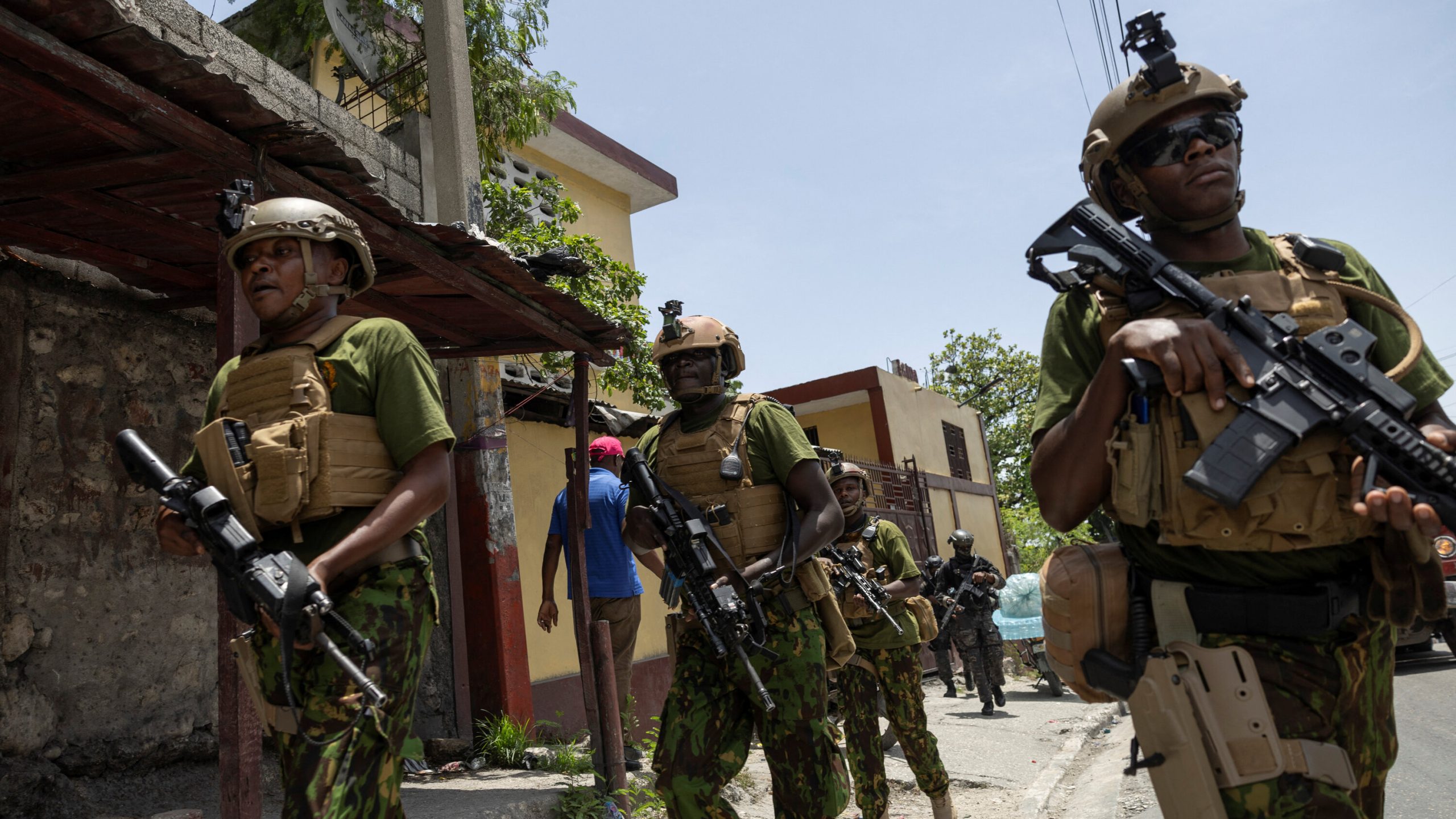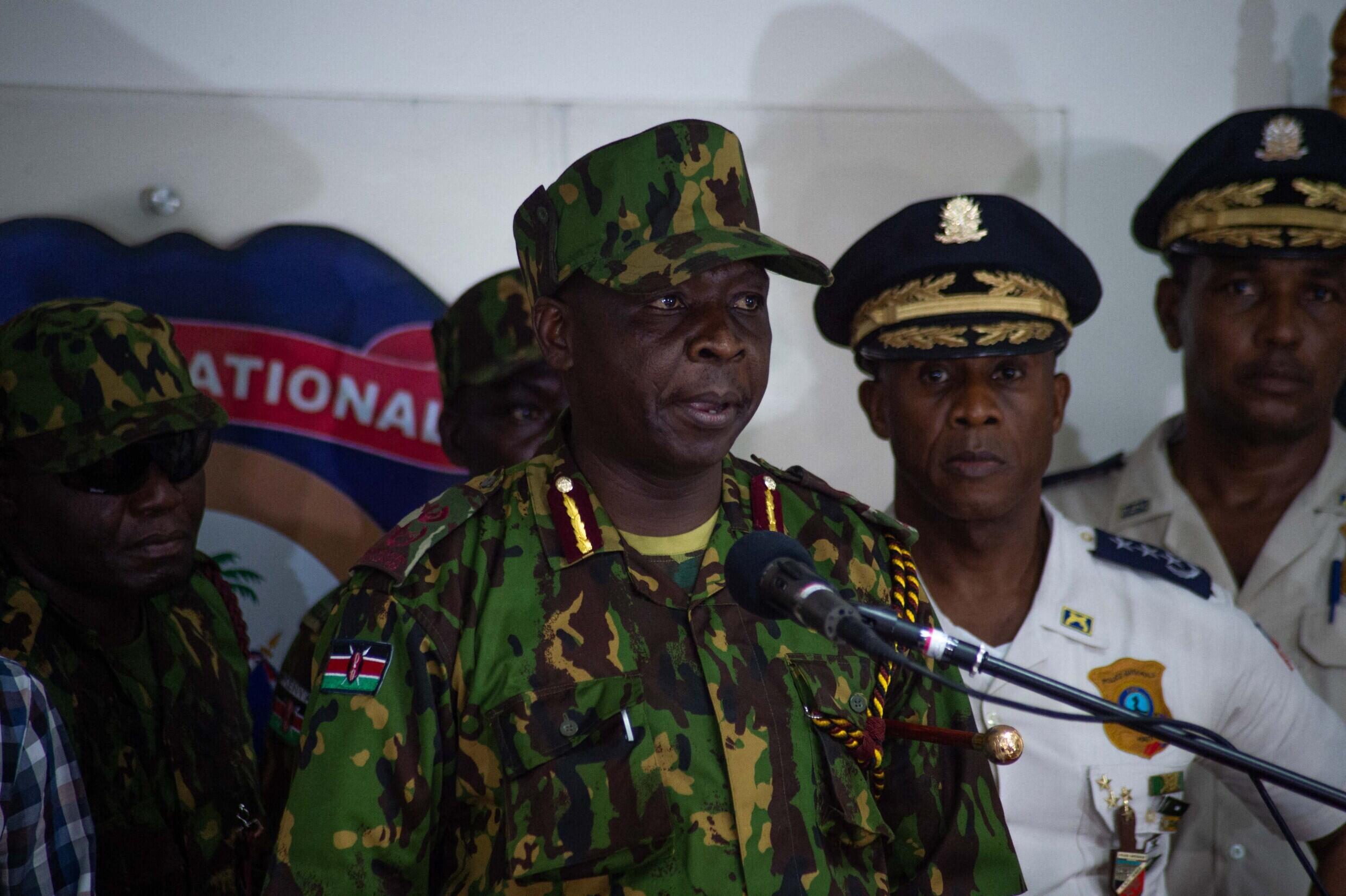News
Kenyan Police in Haiti Unveil New Strategy to Crush Gang Rule in Port-au-Prince

Port-au-Prince is now the battlefield of a new kind of war—not between states, but between peace and terror.
After months of deadly gang violence that has crippled government institutions and left neighborhoods lawless, the Kenyan-led Multinational Security Support (MSS) mission is stepping up its game.
Commander Godfrey Otunge, head of the Kenyan Police in Haiti, has laid out a bold new strategy aimed at breaking the grip of gangs and restoring order in the beleaguered Haitian capital.
With international backing and renewed morale, this mission could be Haiti’s last hope.

The MSS hopes that by establishing a permanent presence in unstable areas, it can prevent gangs from regrouping and taking over strategic locations, as they have done in the past. [Photo: Courtesy]
Kenyan Police in Haiti Unveil New Strategy to Dislodge Gangs
The Multinational Security Support (MSS) mission, led by Kenyan police forces, is entering a decisive new phase in Haiti. On Thursday, June 26, Commander Godfrey Otunge announced that the MSS will establish Forward Operating Bases (FOBs) across Port-au-Prince.
These military-style bases will allow the peacekeepers to stay embedded within volatile neighborhoods and respond faster to gang threats. According to Otunge, the FOBs are designed to improve intelligence collection and strengthen rapid response efforts.
“This is not business as usual,” said Otunge during the MSS mission’s first anniversary celebration. “We are going after the gangs with strategy, precision, and full resolve.”
The gangs, some of which have seized control of police stations, government ministries, and roads in Port-au-Prince, are now facing a better-prepared force. The Kenyan police contingent has restructured its approach, combining military tactics with community intelligence. Otunge stated that peacekeepers are now “smarter, more focused, and determined” to bring security back to Haiti.
He praised the personnel under his command as “a beacon of hope” and proof of what countries can achieve through global unity. He also sent a direct message to the gang networks: “You will no longer operate with impunity.”
Peacekeepers Take a Stand with Support from Global Allies
The newly unveiled strategy comes with solid backing from international partners. Otunge expressed gratitude to countries such as the United States, Dominican Republic, Japan, Spain, and the United Kingdom for supporting the mission logistically and financially.
This support, he said, has empowered the MSS to confront deep-rooted gang networks, despite logistical and budgetary constraints that have plagued the mission since its launch.
Otunge also highlighted a new development — the introduction of a Complaint Reporting Mechanism aimed at tackling any cases of sexual exploitation and human rights violations by MSS personnel. This system is expected to boost transparency and discipline within the ranks, while ensuring the mission maintains trust with local communities.
Despite progress, challenges remain. The disappearance of Kenyan officer Benedict Kabiru in March 2024 continues to haunt the mission. Kabiru vanished during an operation in Savien, a region nearly 100 km from Port-au-Prince.
While his family has pleaded with both the Kenyan and Haitian governments for answers, conflicting reports have emerged. Haiti’s Presidential Transition Council claimed Kabiru was shot and killed in action, and that gangs made away with his body. However, no official confirmation has been provided, and the MSS has yet to locate his remains.
Otunge acknowledged the incident and reaffirmed that the mission was doing everything possible to support the peacekeepers and their families — both on the ground and back home.
Forward Operating Bases Aim to Break Gangs’ Hold on Capital
The Kenyan Police in Haiti have shifted from defensive patrols to a more offensive strategy. At the heart of the new plan are the Forward Operating Bases, which will serve as nerve centers for operations in gang-infested zones.
These bases will allow for 24/7 surveillance, better coordination, and faster deployment of peacekeeping units during attacks. Intelligence officers stationed at the FOBs will work closely with local informants to identify gang leaders and dismantle their support systems.
The MSS hopes that by establishing a permanent presence in unstable areas, it can prevent gangs from regrouping and taking over strategic locations, as they have done in the past.
This proactive approach is a major shift from the early days of the mission, where limited logistics and coordination slowed down responses. Otunge noted that lessons have been learned, and the mission is now focused on results — not just presence.
With its new strategy, the Kenyan-led MSS hopes to do more than just stop gang violence — it aims to restore a functioning society in a country that has known nothing but chaos for years.
Kenya Insights allows guest blogging, if you want to be published on Kenya’s most authoritative and accurate blog, have an expose, news TIPS, story angles, human interest stories, drop us an email on [email protected] or via Telegram
-

 Grapevine2 weeks ago
Grapevine2 weeks agoRussian Man’s Secret Sex Recordings Ignite Fury as Questions Mount Over Consent and Easy Pick-Ups in Nairobi
-

 News1 week ago
News1 week agoTHE FIRM IN THE DOCK: How Kaplan and Stratton Became the Most Scrutinised Law Firm in Kenya
-

 Investigations1 week ago
Investigations1 week agoMulti-Million Dollar Fraud: Three Kenyans Face US Extradition in Massive Cybercrime Conspiracy
-

 Economy1 week ago
Economy1 week agoIran Demands Arrest, Prosecution Of Kenya’s Cup of Joe Director Director Over Sh2.6 Billion Tea Fraud
-

 Business1 week ago
Business1 week agoA Farm in Kenya’s Rift Valley Ignites a National Reckoning With Israeli Investment
-

 Africa2 weeks ago
Africa2 weeks agoFBI Investigates Congresswoman Ilhan Omar’s Husband’s Sh3.8 Billion Businesses in Kenya, Somalia and Dubai
-

 Grapevine5 days ago
Grapevine5 days agoA UN Director Based in Nairobi Was Deep in an Intimate Friendship With Epstein — He Even Sent Her a Sex Toy
-

 News2 weeks ago
News2 weeks agoTragedy As City Hall Hands Corrupt Ghanaian Firm Multimillion Garbage Collection Tender
















